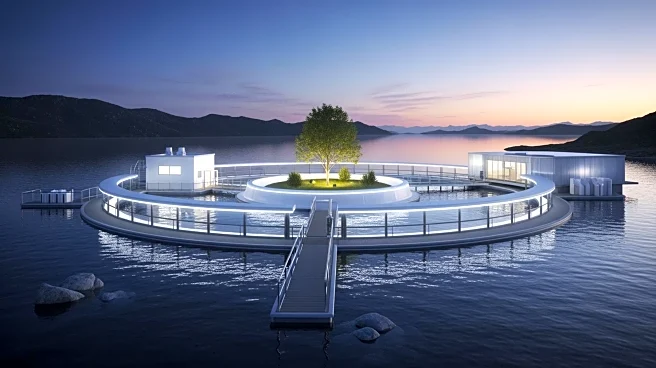What's Happening?
Denmark is set to establish the world’s first circular fish farm, Onnest, which aims to achieve zero waste and a 95% fish survival rate. The facility will utilize local algae-based feed instead of imported
soy to reduce emissions and integrate energy reuse and waste recycling. The project emphasizes fish welfare and aims to produce premium fish that are traceable, certified, and welfare-focused for consumers. The Onnest trout farm in Hirtshals will be open to the public, showcasing circularity and integrating with the surrounding landscape. The facility plans to start construction in late 2026 or early 2027, with production expected to begin in 2028.
Why It's Important?
The Onnest fish farm represents a significant shift towards sustainable aquaculture practices, addressing environmental concerns associated with conventional fish farming, such as waste and chemical pollution, high disease rates, and threats to local ecosystems. By focusing on circular operations and local feed production, the facility aims to reduce greenhouse gas emissions and improve fish welfare, potentially setting a new standard for the industry. The project could serve as a model for sustainable aquaculture worldwide, promoting regenerative, waste-free production models and high standards of animal welfare.
What's Next?
Once operational, Onnest plans to sell its fish at a premium price point, reflecting the regenerative production model and high standards of animal welfare. The facility aims to engage consumers directly in sustainable food systems, potentially using blockchain technology for full traceability of each fish. If successful, the concept could be scaled globally, with potential applications in other countries such as Holland, France, and Japan.
Beyond the Headlines
The Onnest project highlights the importance of integrating circularity into aquaculture design from the outset, requiring collaboration across disciplines such as feed, energy, waste, architecture, and social impact. The facility’s focus on fish welfare and environmental sustainability could drive innovation in aquaculture practices, encouraging other operators to adopt similar models and contribute to global efforts to reduce the environmental impact of food production.












